Senior US and Russian officials began their first round of talks in Riyadh, Saudi Arabia, on February 18, with the focus on efforts to find a solution to the conflict between Ukraine and Russia.
According to CNN, the US delegation included Secretary of State Marco Rubio and National Security Advisor Mike Waltz, while the Russian delegation included Foreign Minister Sergei Lavrov and assistant Yury Ushakov of Russian President Vladimir Putin.
Russia toughens talks with US as Ukraine excluded from dialogue
RT quoted Mr. Ushakov as saying that the purpose of the bilateral dialogue was to lay the foundation for ending the conflict in Ukraine. Russia and the US both see the dialogue as the beginning of a potentially long process. The Kremlin said on February 18 that Mr. Putin was ready to talk with President Volodymyr Zelensky "if necessary", but reiterated questions about the legitimacy of the Ukrainian leader. Kremlin spokesman Dmitry Peskov said that Ukraine's accession to the European Union (EU) was the " sovereign right" of any country, but Moscow opposed Kyiv's entry into NATO, according to AFP.
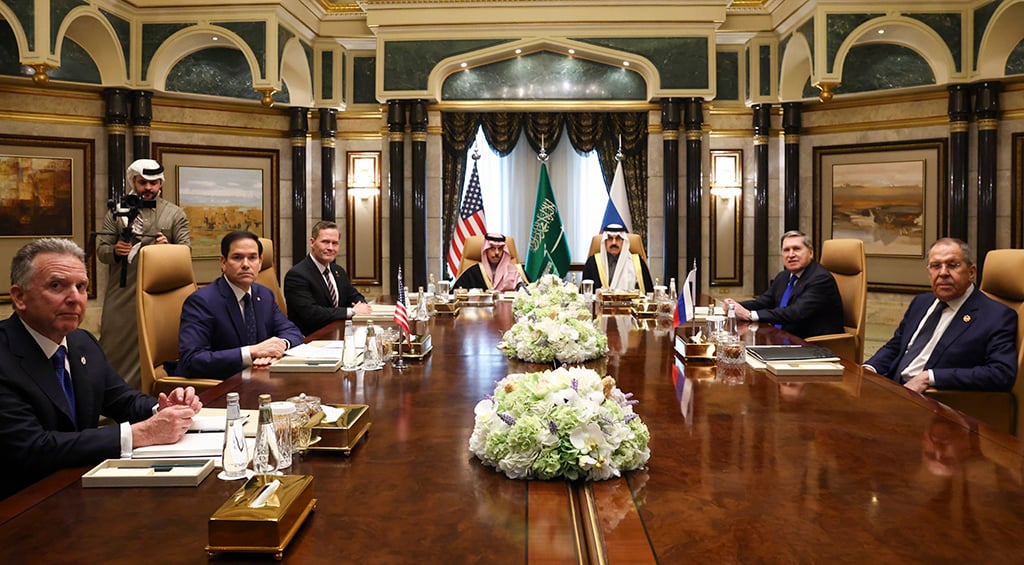
Russian and US delegations met with Saudi Arabian officials in Riyadh on February 18.
Many sides speak up
Meanwhile, Ukrainian President Volodymyr Zelensky said he knew "nothing" about the talks in Riyadh and "cannot recognise anything or any agreement about us without us" being involved. The leader said any peace deal would need to include "strong and reliable" security guarantees.
Concerned about not being invited to the dialogue in Riyadh, French President Emmanuel Macron convened an emergency summit in Paris on February 17 with European leaders. "We seek a strong and lasting peace in Ukraine," Reuters quoted him as saying, stressing the need for strong and reliable security guarantees for Ukraine, otherwise there will be a short and ineffective ceasefire. He called on Europe to coordinate with the United States and Ukraine to shape a sustainable security framework.
Emergency European Summit: Which countries promised to send troops to Ukraine?
For his part, British Prime Minister Keir Starmer said that the US security commitment is the only way to ensure lasting peace for Ukraine. After attending the meeting in Paris, the leader called on European countries to increase defense spending and take more responsibility for the continent's security. At the same time, he emphasized that "there must be US protection, because US security guarantees are the only way to effectively deter" Russia.
Commenting on the US-Russia dialogue, Chinese Foreign Ministry spokesman Guo Jiakun said Beijing welcomes all efforts for peace, including the consensus reached in the dialogue. Meanwhile, China hopes "all relevant parties participate in the negotiation process in a timely manner," according to Mr. Guo.
Keith Kellogg, the US special envoy for Ukraine and Russia, is expected to arrive in Ukraine today to discuss diplomatic and military support and peace efforts. According to The Guardian , European Commission President Ursula von der Leyen told Kellogg that Europe wants to “work alongside the US” for lasting peace in Ukraine.
European controversy
At the same summit in Paris, France proposed setting up a "reassurance force" stationed behind the future ceasefire line in Ukraine, rather than along it. British Prime Minister Keir Starmer said he was willing to consider sending British forces to the field with other countries and with US support, if there was a lasting peace deal. However, the leaders of Germany, Italy, Poland and Spain were indifferent to the idea of peacekeeping forces in Ukraine.
After the meeting, German Chancellor Olaf Scholz said that discussing sending troops to Ukraine was "very inappropriate" and untimely, given the ongoing war. He stressed that if there was a clear framework for the deployment of troops, Germany would "not hesitate" to participate.
Sweden, the Netherlands and Spain are also hesitant, as is Germany, according to The Independent . Italian Prime Minister Giorgia Meloni said sending European troops to Ukraine was the most complicated and least likely to be effective option, the Financial Times reported, citing sources at the meeting.
US Congress disagrees on policy
The Hill reported on February 17 that the confrontation between the Republican Party in the US House of Representatives and the US Senate is escalating as the two groups are pursuing opposite strategies. Currently holding the majority in both the US Senate and the US House of Representatives, the Republican Party is designing a budget plan for a bill to promote the agenda of US President Donald Trump.
Specifically, the House of Representatives recently released a new budget plan with a proposal to cut $2 trillion in spending, aiming to promote President Trump's agenda on border security, defense, energy and tax cuts. Meanwhile, the Republican Party in the US Senate also released its own budget plan.
"If we let the House design it, we feel there's a very good chance we won't get any of it passed," said the Republican senator. The differences in approach between the two chambers of Congress have created a stalemate, forcing leaders of both sides to seek a compromise solution. But, according to The Hill , neither side seems ready to compromise.
Tri Do
Source: https://thanhnien.vn/my-nga-doi-thoai-ve-ukraine-chau-au-lo-ngai-185250218201506579.htm



![[Photo] Prime Minister Pham Minh Chinh launched a peak emulation campaign to achieve achievements in celebration of the 14th National Party Congress](https://vphoto.vietnam.vn/thumb/1200x675/vietnam/resource/IMAGE/2025/10/5/8869ec5cdbc740f58fbf2ae73f065076)






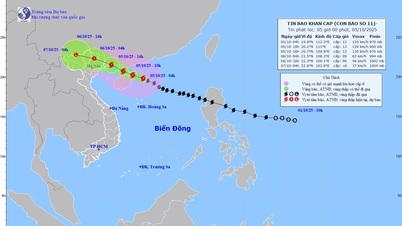

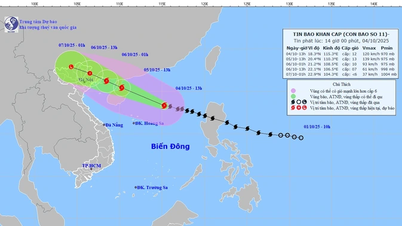

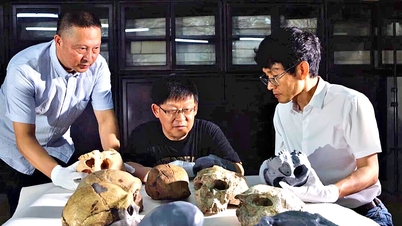



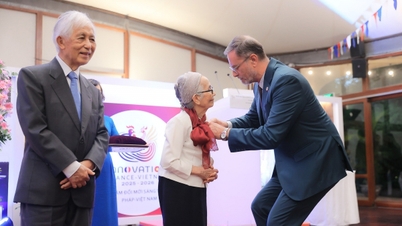

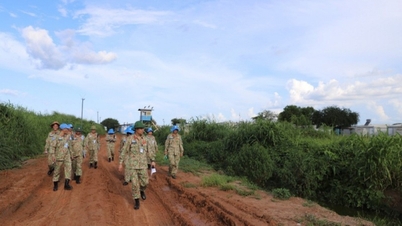















![[Photo] Bustling Mid-Autumn Festival at the Museum of Ethnology](https://vphoto.vietnam.vn/thumb/1200x675/vietnam/resource/IMAGE/2025/10/4/da8d5927734d4ca58e3eced14bc435a3)






















![[VIDEO] Summary of Petrovietnam's 50th Anniversary Ceremony](https://vphoto.vietnam.vn/thumb/402x226/vietnam/resource/IMAGE/2025/10/4/abe133bdb8114793a16d4fe3e5bd0f12)

![[VIDEO] GENERAL SECRETARY TO LAM AWARDS PETROVIETNAM 8 GOLDEN WORDS: "PIONEER - EXCELLENT - SUSTAINABLE - GLOBAL"](https://vphoto.vietnam.vn/thumb/402x226/vietnam/resource/IMAGE/2025/7/23/c2fdb48863e846cfa9fb8e6ea9cf44e7)






























Comment (0)